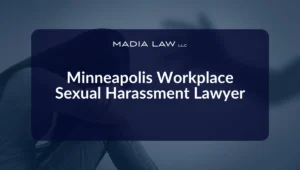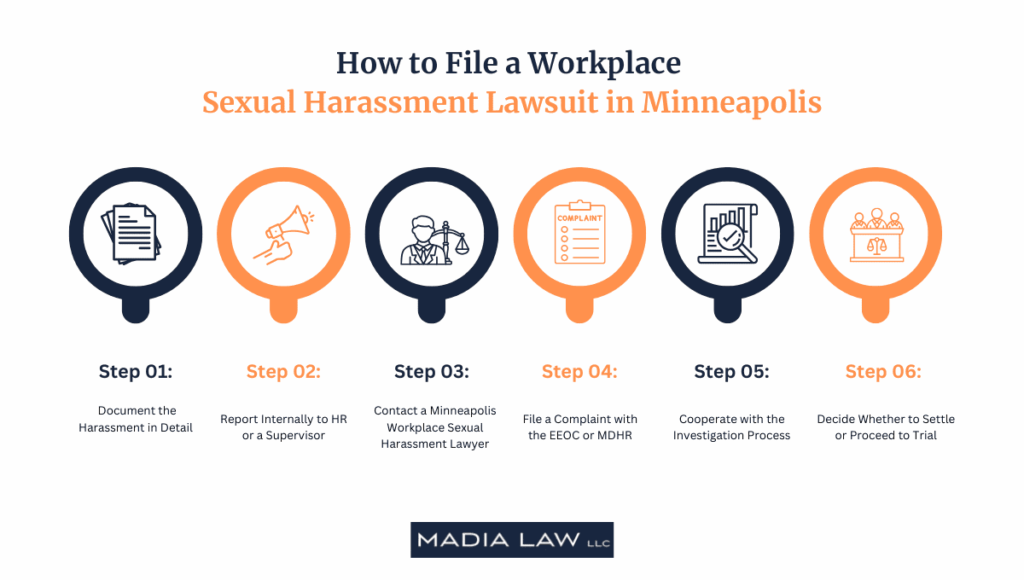
Workplace sexual harassment is a harrowing experience that can leave you feeling humiliated, isolated, and powerless, as well as put your job, income, or reputation on the line. Whether you have been demoted, forced to quit, or simply endured a hostile work environment, Madia Law is here to fight for you.
Led by seasoned trial attorney Ashwim Madia, our Minneapolis-based law firm is dedicated exclusively to representing employees, never corporations. We have secured justice for hundreds of workers across Minnesota, including a $1.95 million settlement for a group of women who endured sexual harassment by a supervisor and had their claims ignored by company leadership. We hold employers accountable under both state and federal law, including the Minnesota Human Rights Act (MHRA) and Title VII of the Civil Rights Act.
We work solely on a contingency fee basis, meaning you pay nothing unless we win your case.
Call us at 612-349-2729 today or request a confidential consultation online. Your voice matters, and we are ready to act.
What a Minneapolis Workplace Sexual Harassment Lawyer Does for You
A Minneapolis workplace sexual harassment lawyer protects your rights, builds your case, and holds your employer accountable.
At Madia Law, our Minneapolis employment attorneys will guide you through every step, from the moment you contact us until the final resolution of your claim. We listen to your story, gather critical evidence, and take immediate legal action when needed.
Investigates Harassment Claims and Collects Evidence
Madia Law builds your case piece by piece by gathering direct proof of what happened and how your employer responded.
To prove workplace sexual harassment, we start by documenting the details. Text messages, emails, team communication logs, and other official company records often tell the story clearly. We interview coworkers and former employees who witnessed what you endured. We request those internal files, including incident reports and investigation notes, if you have reported the harassment to HR.
We verify every detail because strong evidence leads to stronger outcomes.
Files Complaints with EEOC and Minnesota Human Rights Dept
We handle the legal filings, so you do not have to decipher and fill out confusing government forms alone.
You can file a claim with either the Equal Employment Opportunity Commission (EEOC) or the Minnesota Department of Human Rights (MDHR) if you are facing workplace harassment. Both agencies investigate violations, but the right one to contact will depend on your situation.
Applies Local Legal Strategy Based on Employer Behavior
Madia Law builds your case around how employers in the Minneapolis / St. Paul area handle harassment claims and how they respond when they are held accountable.
We have spent years confronting local corporations, small businesses, healthcare systems, and tech firms in the Twin Cities and across all of Minnesota. Some have a past history of delaying investigations. Others have a reputation for intimidating employees into silence. We recognize the patterns, and we know how to counter them.
We tailor every legal strategy based on the company’s size, structure, and industry standards. That means stronger leverage in negotiations, more persuasive evidence in court, and a clear path to resolution.
Whether your employer operates out of downtown Minneapolis or a suburban office park in Hennepin, Ramsey, or Anoka County, we bring to your disposal a focused, local approach that gets results.
Represents You in Settlement Negotiations and Civil Court
Madia Law LLC stands by your side through every negotiation and in every Minnesota county or municipal courtroom.
We begin by demanding fair compensation for what you have endured. In many cases, employers end up settling out of court before trial. We use documented evidence, legal precedent, and employer-specific patterns to increase your leverage and negotiate maximum recovery.
We will go to court if your employer does not offer fair compensation. As a premier trial-first firm in Minnesota, we prepare every case from day one as if it is heading to a jury. This pressure, applied often, drives stronger settlement offers.
Prepares Every Case as Trial-Ready from Day One
At Madia Law, we treat each and every harassment case as if it will be going to trial, even if it ends up settling.
From the moment you contact us, we provide clear, step-by-step legal advice. We help you understand your rights, collect documentation, respond to your employer, and remain under legal protection at every stage. We will have already built the file, gathered witnesses, and crafted the argument if your case moves to court.
We do not wait for employers to play fair. We build pressure early, and we never back down when your future is at stake.
For a legal consultation with a sexual harassment lawyer serving Minneapolis, call 612-349-2729
What Compensation Can Our Lawyers Help You Recover?
Workplace harassment takes a serious toll on victims, not only emotionally but also financially.
You are most likely entitled to compensation for what you have suffered and lost in a sexual harassment claim. This can include direct costs like lost income or therapy, as well as less visible negative ramifications like emotional trauma and long-term career setbacks.
Emotional Distress and Psychological Damages
Harassment at work often causes lasting emotional harm, and thus, the law allows you to seek compensation for experiencing it.
Emotional distress refers to the mental and psychological pain caused by what you experienced on the job. This may entail anxiety, depression, PTSD, insomnia, or panic attacks linked directly to the harassment. These aftereffects are very real, and Minnesota courts recognize them as recoverable damages.
We work with established mental health professionals to document how the harassment affected your emotional health. We also gather testimony and supporting evidence that shows the impacts on your daily life, relationships, and overall well-being.
Set up a time to talk to us if harassment has changed the way you feel, think, or function. We can help make that pain an integral part of your case.
Lost Wages, Missed Promotions, and Future Earnings
You are owed more than just a verbal apology if harassment or retaliation disrupted your career. Victims of workplace harassment suffer from lost income, sometimes permanently. In such cases, you are entitled to:
- Back pay for wages you lost after being fired or forced to quit.
- Missed promotions or raises you did not get because of retaliation or bias.
- Front pay for future earnings lost if it is not possible to return to that job.
If you were passed over for a management role because you reported harassment, that is not just unfair but is a financial loss; we can calculate it, and we can recover it for you.
Punitive Damages for Employer Misconduct
Punitive damages punish employers who knowingly allow harassment, or worse, try to cover it up.
These damages are awarded when a company’s behavior goes beyond negligence. Your employer can be held financially responsible beyond your personal losses if they ignored formal complaints, failed to investigate, or allowed repeated harassment to continue.
For example, if multiple employees at a Minnesota job site reported the same harasser and management refused to act, that may justify punitive damages. The goal is to send a clear message: this conduct will not be tolerated.
Legal Fees and Court Costs
Minnesota law may require your employer to pay your legal fees and related court costs if you win your case.
That means you will not be left covering the litigation expenses for standing up for your rights. Depending on your case, recoverable costs can include:
- Filing fees for state or federal complaints
- Deposition transcripts and expert witness fees
- Court costs for scheduling, subpoenas, and trial preparation
At Madia Law LLC, we work on a contingency fee basis, so you owe nothing unless we win. And when we win, we fight to recover every single dollar for you, including the ones you spent seeking justice.
Out-of-Pocket Costs (Therapy, Relocation, Medical Bills)
You can recover the money you have spent trying to rebuild your life after workplace harassment.
Many employees pay for critical support just to cope with the damage caused by harassment. These expenses are often compensable when directly linked to your case. Common examples include:
- Therapy or mental health counseling
- Medical treatment related to stress, anxiety, or physical symptoms
- Job relocation, if you had to leave a toxic workplace
- Career re-training or re-skilling after forced resignation or discharge
We help document each cost and connect it legally to the harassment you endured, so you are not left carrying the financial burden alone.
Minneapolis Sexual Harassment Lawyer Near Me 612-349-2729
How to File a Workplace Sexual Harassment Lawsuit in Minneapolis
Filing a workplace sexual harassment lawsuit involves specific steps, and the right guidance makes all the difference.
At Madia Law, we walk Minneapolis employees through every part of the legal process, from documenting what happened to deciding whether to settle or go to trial. You do not need legal experience to pursue justice; you just need someone who knows how to fight for you.
Step 1: Document the Harassment in Detail
Start by creating a private, detailed record of every incident. Write down what happened, when it happened, who was involved, and how it made you feel.
Use dates, times, and direct quotes whenever possible. Save emails, texts, chat logs, voicemails, anything that shows what was said or done.
Make a note of what was said and who else may have heard it if the conversations took place in person. These early details become crucial evidence later, especially if your employer tries to deny your report.
Step 2: Report Internally to HR or a Supervisor
Submit an internal incident report in writing as soon as possible.
Go to your company’s HR department or a supervisor you trust, and explain what happened. While verbal reports are allowed, written complaints are stronger, especially if the company later denies knowing about the issue.
Include the who, what, when, and where of each incident. Ask for confirmation that your report was received. Save a copy of it if you send it by email. Keep a scanned version if it is a physical letter.
Step 3: Contact a Minneapolis Workplace Sexual Harassment Lawyer
Before filing with a government agency, speak with a sexual harassment lawyer who is well-versed in representing the interests of employees, not companies.
The next step in your case involves making legal filings. But how and where you file can affect the outcome of your entire claim. That is why it is critical to get legal advice before moving forward on your own.
At Madia Law, we offer confidential consultations to review your case, explain your options, and guide you through the best path forward. We will help you decide whether to file with the EEOC, file with the Minnesota Department of Human Rights, or pursue a lawsuit directly.
Step 4: File a Complaint with the EEOC or MDHR
Filing a formal complaint starts the legal process, and where you file matters.
You can file with either the Equal Employment Opportunity Commission (EEOC) or the Minnesota Department of Human Rights (MDHR). Both agencies investigate sexual harassment claims, but they operate under different laws.
- EEOC (Federal): Covers Title VII violations. It applies if your employer has 15 or more employees.
- MDHR (State): Enforces the Minnesota Human Rights Act. It can apply to smaller employers and offers protections tailored to Minnesota law.
Filing with one agency typically blocks you from filing separately with the other, so it is important to choose wisely. A well-drafted complaint increases your chance of success, and that is something our experienced staff can capably and expediently handle for you.
Step 5: Cooperate with the Investigation Process
After your complaint is filed, the agency will open an investigation, and your participation is essential.
You may be asked to:
- Provide documents or communications related to your harassment claim.
- Attend interviews or respond to written questions.
- Identify witnesses who can confirm your report.
- Stay reachable in case the investigator needs more details or clarification.
The more detailed and more complete your participation, the stronger your case becomes. We support you through the entire process, making sure that your voice is clearly heard and that you respond to each request professionally and on time.
Step 6: Decide Whether to Settle or Proceed to Trial
Most harassment cases settle, but if a fair deal is not offered, we will be ready for trial.
After the investigation wraps up, your employer may propose a settlement. Settlements can offer compensation without going to court, and they often make sense when the terms are just. But if the offer falls short, Madia Law will be working since day one to prepare your case for trial.
We will walk you through your options, explain the risks and rewards of each one, and give you honest advice about what path is best for your future.
Click to contact our Employment Lawyers in Minneapolis, MN for Workplace Legal Issues today
Statute of Limitations for Filing Workplace Harassment Claims in Minnesota
To preserve your right to sue, you must act within strict legal deadlines. In Minnesota, you have 300 days to file a federal claim with the EEOC, and 1 year to file a state claim with the Minnesota Department of Human Rights (MDHR).
Missing these deadlines can result in losing your right to pursue any legal action. That is why it is critical to speak with an attorney as soon as you suspect workplace harassment.
Filing Deadlines:
- EEOC (Federal): 300 days from the most recent incident
- MDHR (Minnesota): 1 year from the most recent incident
Complete a Case Evaluation form now
What Your Employer Cannot Legally Do After You Report Workplace Harassment
It is illegal for your employer to retaliate against you for reporting harassment.
Whether you report it to HR, a supervisor, or a government agency, the law protects you from being punished for speaking up. That means no demotions, no terminations, no intimidation, and no silent punishment behind the scenes.
Retaliation is Illegal Under Federal and Minnesota Law
Your employer cannot punish you for reporting or resisting workplace harassment, and the law is explicitly clear on that.
Retaliation includes any negative action taken against you because you spoke up. Under Title VII of the Civil Rights Act and the Minnesota Human Rights Act (MHRA), this conduct is illegal.
Examples of retaliation include:
- Demotion or job reassignment
- Termination or forced resignation
- Isolation, schedule changes, or exclusion from meetings
- Negative performance reviews used as punishment
Even subtle forms of retaliation can be unlawful if they are tied to your complaint. We identify these tactics and act quickly to stop them.
How Our Lawyers Intervene to Protect You From Retaliation
When your employer retaliates, we take immediate legal action to stop it.
We do not wait for retaliation to escalate. We act fast with legal tools designed to protect you. These include:
- Cease-and-desist letters sent directly to your employer
- Emergency motions filed in court to stop harmful actions
- Retaliation claims added to your case for additional damages
We have deployed these legal defenses for thousands of employees across Minnesota, reversing retaliation, reinstating jobs, and lifting pressure so clients could move forward safely.
Let us intervene if your employer has turned against you after you reported harassment. Call today for immediate help.
How Our Minneapolis Lawyers Counter Common Employer Defenses
Employers often deny wrongdoing, but we know how to dismantle their arguments. At Madia Law LLC, we challenge every excuse with evidence, legal precedent, and courtroom experience built on years of success across Minnesota.
“It Was Consensual” or “Just Harmless Jokes”
When employers attempt to claim the conduct was welcome or lighthearted, we bring the focus back to how it made you feel and how the law defines harassment.
Under both federal and Minnesota law, unwanted advances, comments, or jokes that create a hostile environment qualify as harassment even if others did not object. We use your testimony, workplace culture evidence, and witness accounts to show that the behavior crossed the legal line.
“You Waited Too Long to Report It”
Delay does not disqualify your claim, and we prove why.
Some employees wait to report harassment out of fear, shame, or uncertainty. The law in Minnesota recognizes that contingency. As long as you are within the legal time limits (300 days with the EEOC, 1 year with MDHR), your report remains valid. We explain delays clearly and focus the court’s attention on the misconduct, not the calendar.
“There Were No Witnesses or Proof”
You do not need an audience to prove that harassment happened.
Most harassment happens behind closed doors. That is why the law accepts circumstantial and documentary evidence, such as emails, texts, timing patterns, and behavioral changes. We build the full picture through your recollections and accounts, supporting documents, and expert analysis.
How We Use Evidence and Legal Precedent to Win
We do not just argue persuasively for your position; we anchor your case on facts and case law.
We back your claim with evidence that meets exacting legal standards. We cite past rulings, employer patterns, and workplace policy failures to strengthen your case. Judges and juries rely on proof, and we bring it every time.
Ready to take your case from personal to provable? Let us talk strategy.
What Qualifies as Workplace Sexual Harassment in Minnesota
Workplace sexual harassment happens when someone at work subjects you to unwelcome behavior based on your sex or gender. It is illegal under both federal and Minnesota law.
Under Title VII of the Civil Rights Act and the Minnesota Human Rights Act (MHRA), harassment becomes unlawful when it affects your ability to do your job, creates a hostile environment, or involves threats tied to your employment.
Recognized Forms of Harassment Under State and Federal Law
There are two primary legal categories of workplace sexual harassment:
- Quid pro quo occurs when a supervisor ties job benefits, such as promotions or continued employment, to sexual conduct. One request, if coercive enough, can be illegal.
- Hostile work environment occurs when repeated unwanted comments, physical content, or other actions make the workplace intimidating or offensive.
Both are recognized under Title VII and MHRA, and both give you the right to take legal action.
Common Signs You Are Experiencing Illegal Workplace Conduct
You may be experiencing workplace harassment if you notice certain patterns, and they do not have to be extreme to be unlawful.
Watch for red flags like:
- Unwanted sexual comments or jokes made regularly
- Inappropriate touching or physical closeness
- Repeated requests for dates or personal attention
- Spreading of rumors, especially of a sexual nature
- Pressure to stay silent or threats after you object
You are not overreacting, and you are not alone if any of this sounds familiar. Call us to seek justice now!
Why Choose Madia Law for Your Harassment Case?
Not all law firms are built for the rigorous demands of taking cases to trial. Madia Law LLC is. We do not just seek to settle; we fight for fair outcomes, and we are relentless in pursuing victory. When you work with us, you get more than legal advice. You get a partner who believes in your story, builds your case with precision, and holds your employer accountable under Minnesota and federal law.
100% Employee Representation – Never Employers
We only fight for employees, never for employer corporations. We have built our entire practice around understanding and protecting employee rights. That means no conflicts of interest, no divided loyalty, and no switching sides. We understand what it is like to stand up to authority abusing its power, because that is all we do.
No Win, No Fee – Contingency-Based Legal Services
We believe cost should never be a barrier to justice. That’s why we handle harassment cases on a contingency fee basis. You owe us nothing upfront and nothing at all unless we recover compensation on your behalf.
Proven Success in Harassment and Retaliation Claims
Our extensive track record speaks for itself: hundreds of favorable verdicts, settlements, and results. We have secured multi-million-dollar outcomes for Minnesota employees in cases involving sexual harassment, wrongful termination, and retaliation.
Whether it is a negotiated resolution or a jury verdict, we bring trial-tested strategy to every claim.
Transparent, Direct Access to Your Attorney
When you hire us, you work with a lawyer, not a call center. From your first meeting to your final outcome, you will have direct communication with an attorney who knows your case inside and out. We keep you informed, involved, and in control every step of the way.
Have questions? We will answer them personally. We also fight cases regarding wrongful termination, whistleblower protection, wage disputes, and racial discrimination.
Workplace Sexual Harassment vs. Sex Discrimination: Key Legal Differences
Sexual harassment and sex discrimination are different legal claims, but they often occur together.
Sexual harassment involves unwanted behavior, comments, or conduct based on sex or gender. Sex discrimination, on the other hand, typically involves decisions about hiring, firing, pay, or promotions made because of your sex. Both are illegal, and both can be part of the same lawsuit.
When Harassment Crosses Into Discrimination
Workplace harassment becomes sex discrimination when it affects your job status, pay, or opportunities based on gender.
If a supervisor punishes you for rejecting sexual advances, or if harassment leads to demotion, denied promotions, or unequal pay, your case may qualify as both harassment and discrimination under Title VII and the Minnesota Human Rights Act (MHRA).
We help you determine how the law applies and pursue every available claim.
Filing Dual Claims Under Minnesota and Federal Law
You can file both harassment and discrimination claims at the same time, and we will handle the process for you.
Our lawyers regularly file dual claims with the EEOC and MDHR. Doing so ensures all legal grounds are covered and gives you the strongest legal protection available. We will clearly argue both claims using evidence that supports each one under the law if your case goes to court.
Areas Our Minneapolis Harassment Lawyers Serve
Madia Law proudly represents employees across Minneapolis and the greater Twin Cities metro.
Whether you live downtown or in a nearby suburb, our team is ready to help you take action against workplace harassment. We offer consultations in person, by phone, or online, whatever works best for you.
We are right here in your neighborhood and ready to help if you are searching for a sexual harassment lawyer in Minnesota.
Speak With a Minneapolis Sexual Harassment Lawyer Today
You do not have to stay silent, and you do not have to handle your emotionally trying situation alone.
Our attorneys at Madia Law listen, advise, and act. We offer confidential consultations, no upfront fees, and direct communication from the very first call if you have been harassed, retaliated against, or pushed out of your job.
Contact us now to schedule your obligation-free, confidential consultation. The sooner we start, the stronger your case becomes and the higher the probability of winning.
Call 612-349-2729 or complete a Case Evaluation form





